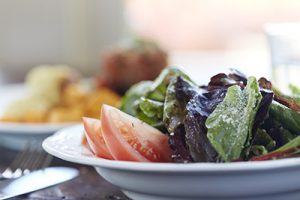For recovering addicts, participating in meaningful activities can restore a sense of purpose, improve self-esteem and provide an alternative to previous unhealthy habits.
Gardening, which combines physical activity, enjoying the outdoors and patiently nurturing seeds into mature plants, can be one of those meaningful activities. Gardening connects people to the earth, promotes relaxation and offers a sense of accomplishment.
At Bluff, patients can participate in tending to the recovery center’s vegetable and herb gardens, where they grow an assortment of produce along with basil, spearmint, thyme and other spices that are used daily by the chefs in preparing healthful (and tasty!) meals.
The vegetable gardens were established a few months ago when a of group of interested patients began building and preparing the soil for four raised planters – two for vegetables and two for herbs.
Soon, they transplanted seedlings grown in an on-site greenhouse into the planters, and began working together to care for the plants. This summer, they’re enjoying the fruits of their labor – a bountiful harvest of peppers, tomatoes, cucumbers, zucchini, peas and cabbage.
The patients have a stake in what’s being grown and what they’re putting in their bodies. They take pride in ownership, and they’re learning that they have to treat the plant well for it to thrive. These are things that we can relate to their lives in recovery as well.
Experiential therapy engages all of the senses
Gardening is a form of experiential therapy, in which patients participate in hands-on activities – such as art, equine or movement therapy – as a way to explore their past behavior and experiences, work through their anxieties, fears and emotions, and discover new ways to solve problems and relate to the world around them. Because experiential therapy engages all of the senses, including sight, smell, touch, as well as physical activity, the lessons are especially memorable.
Digging, tilling, and weeding is good exercise. Gardening also requires delayed gratification, helping clients discover the rewards of working hard toward a goal.
And the harvest itself promotes healthy living. Research shows that living a balanced lifestyle after treatment for addiction and co-occurring disorders can help in avoiding relapse. A balanced lifestyle includes participating in exercise, eating well and having activities or hobbies that can help provide a distraction from any urges to use again.
Tending to the garden is an opportunity to work as a team and for patients to contribute to the well-being of everyone at Bluff, instilling a sense of meaning and accomplishment to the work.
At Bluff, not only are the patients discovering the joys of gardening, the chefs are having fun cooking with fresh, organic vegetables. We see the chef run out the door all the time to go get whatever spices he needs. (Even the deer are getting in on it. They’re nibbling the cabbage every chance they get.)


